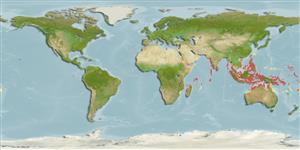>
Eupercaria/misc (Various families in series Eupercaria) >
Scaridae (Parrotfishes) > Scarinae
Etymology: Chlorurus: Greek, chloros = green + Greek oura = tail (Ref. 45335).
More on author: Bleeker.
Environment: milieu / climate zone / depth range / distribution range
Ecología
marino asociado a arrecife; rango de profundidad 5 - 15 m (Ref. 90102). Tropical
Indian Ocean: Maldives. Western Central Pacific: western and central Indonesia (Ref. 9793).
Tamaño / Peso / Age
Maturity: Lm ? range ? - ? cm
Max length : 40.0 cm TL macho / no sexado; (Ref. 48636)
Pinkish green, males with pink margin on gills and pink bars or spots on scales (Ref. 48636).
Found in clear coastal and inner reefs. Shallow coral and algae habitat. Usually mixes with other species when feeding (Ref. 48636). Females form small groups (Ref. 90102).
Life cycle and mating behavior
Madurez | Reproducción | Puesta | Huevos | Fecundidad | Larva
Oviparous, distinct pairing during breeding (Ref. 205).
Bellwood, D.R., 1994. A phylogenetic study of the parrotfishes family Scaridae (Pisces: Labroidei), with a revision of genera. Rec. Aust. Mus. Suppl. 20:1-86. (Ref. 11064)
IUCN Red List Status (Ref. 130435)
Threat to humans
Harmless
Human uses
Más información
ReferenciasAcuiculturaPerfil de acuiculturaRazasGenéticaElectrophoresesheritabilidadEnfermedadesProcesamientoNutrientsMass conversion
ColaboradoresImágenesStamps, Coins Misc.SonidosCiguateraVelocidadTipo de nataciónSuperficie branquialOtolitosCerebrosVisión
Herramientas
Special reports
Download XML
Fuentes de Internet
Estimates based on models
Preferred temperature (Ref.
123201): 27.5 - 29.3, mean 28.7 °C (based on 1665 cells).
Phylogenetic diversity index (Ref.
82804): PD
50 = 0.5000 [Uniqueness, from 0.5 = low to 2.0 = high].
Bayesian length-weight: a=0.01380 (0.00641 - 0.02973), b=3.03 (2.86 - 3.20), in cm total length, based on LWR estimates for this (Sub)family-body shape (Ref.
93245).
Resiliencia (Ref.
120179): Alto, población duplicada en un tiempo mínimo inferior a 15 meses (Preliminary K or Fecundity.).
Fishing Vulnerability (Ref.
59153): Low to moderate vulnerability (30 of 100).
Nutrients (Ref.
124155): Calcium = 35.6 [14.6, 119.6] mg/100g; Iron = 0.613 [0.242, 1.522] mg/100g; Protein = 18.6 [16.6, 20.5] %; Omega3 = 0.0861 [, ] g/100g; Selenium = 30.7 [10.6, 90.8] μg/100g; VitaminA = 49 [15, 162] μg/100g; Zinc = 2.22 [0.99, 3.99] mg/100g (wet weight);
